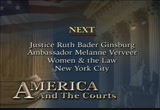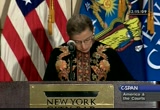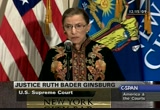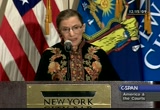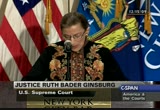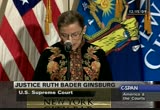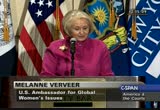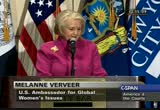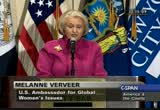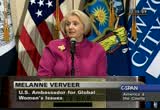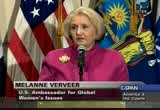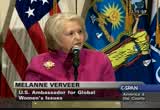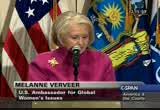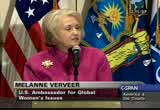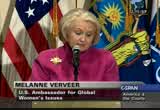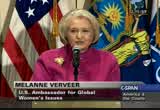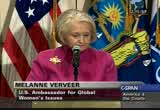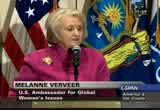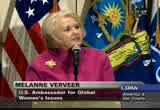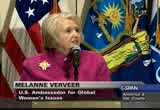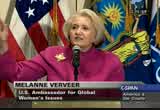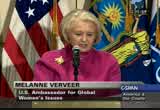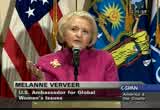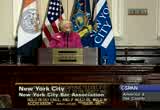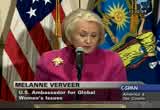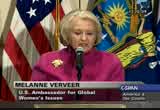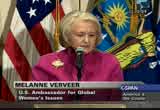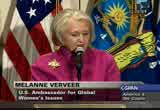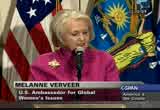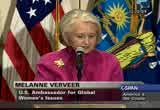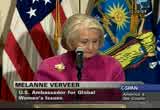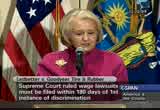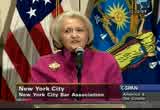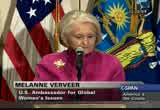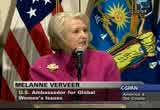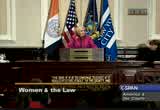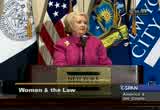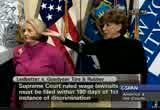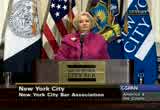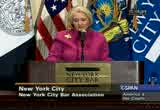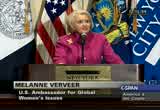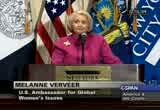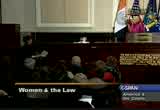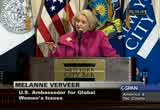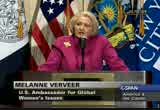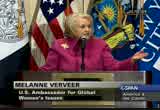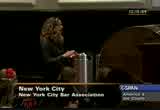tv America the Courts CSPAN January 9, 2010 7:00pm-8:00pm EST
7:00 pm
7:01 pm
>> it's nice to be back in my hometown, and this is my favorite lecture series, too. among our president's innovations, he created a new post at the state department, ambassador at large for global women's issues. and for that important post, he chose melanne verveer, an altogether fitting appointment, freeing women worldwide from fear and want and enabling them to develop their talents without artificial restraint is the mission of the new ambassadorship.
7:02 pm
with melanne at the helm, i anticipate women's rights will become central to human rights agenda. she has an extraordinary capacity for, and in her new job, she has become a globetrotter. functioning fully on not more than four hours of sleep a night, and i know how that is, she prolongs her workday and i'm told she's able to adjust to time changes instantly. indicative of her awesome efficiency, she turned out thanksgiving dinner for her family just 48 hours after she returned from an arduous journey in asia. for decades, melanne has been a
7:03 pm
strong advocate for women's full citizenship stature. prior to her current appointment, she was probably best known for her service as deputy chief of staff to first lady hillary clinton. melanne met bill clinton -- i think i have it right -- even before hillary did. she and the then future president were students at georgetown in the mid 1960's, where she gained fluency in russian and earned bachelor and masters degrees in languages. melanne also met her partner in life at georgetown, philip verveer, but theology class brought them together. philip too has ambassador status in the obama administration. the asked who ranks higher in the two-ambassador family,
7:04 pm
husband phil, their two children and two grandchildren, i am reliably informed, would give the same answer. she's the boss. their widely shared appraisal of melanne's white house role is this. no first lady staff ever had a political operative of the caliber and experience of melanne verveer. critics could point to no flaws except possibly one that would hardly disturb bill and hillary clinton. melanne has a tendency to be just a little late, just as i do . among posts that equipped her fer home run white house work and now her current mission, she
7:05 pm
coordinated civil rights and urban affairs for the u.s. catholic conference's national office, served as field manager for common cause, was legislative director for senator george mcgovern. before joining bill clinton's 1992 presidential campaign and later the clintons' white house staff, she was executive vice president of people for the american way. she is a co-founder and was the c.e.o. of the non-profit vital voices global partnership, a flourishing organization that encourages and trains women in the developing world, including iraq and afghanistan, to gain leadership posts in government and in commerce. it is rumored that in her white
7:06 pm
house years, melanne used her computer screen to post thickets. today she never leaves home without her two blackberries. friends report that she is a marvelous host, and also a world class shopper. called back to asia days after exhausting travel, she remarked with a smile, "it's a great opportunity to take care of the christmas shopping." summing up what melanne believes and strives mightly for all to understand, she said, investments in women have the greatest positive correlation to enhancing a country's general prosperity and poverty alleviation. would you all please join me now in a warm welcome, a very warm
7:07 pm
welcome, to ambassador at large melanne verveer. [applause] melanne >> well, justice ginsburg, thank you so much for that introduction. even though there were some exaggerations, i must admit. but i am indeed so privileged and honored to be here tonight to deliver the annual justice ruth bader ginsburg distinguished lecture on women and the law. and i thank the new york city bar for inviting me. you heard some references to globetrotting. but i did recently did return
7:08 pm
from a trip to asia to four countries, and in seoul, south korea, i was invited to give a talk in observance of international human rights day. and when i met the south korean human rights commissioners, the first comment i got was about the significance of president obama's signing the lily led better fair pay act. and as all of you know, it overturned the supreme court decision that would have applied very strict limits to acts of pay discrimination. now it is noteworthy that in his first bill signing as president of the united states, president obama was upholding justice ginsburg's interpretation of the law in the dissent she filed in
7:09 pm
the 2007 decision. [applause] she once noted that dissents speak to a future age, the greatest dissents do become the dominant view. so that's the dissenter's hope, she said. they are writing not for today, but for tomorrow. and that is exactly what happened in this case. i was serving as the chief of staff to the first lady in the clinton administration when president clinton announced the nomination of justice ginsburg as only the second woman to the highest court. he said at the time that she was brilliant, had a compelling life story whose record was interesting. she was independent,
7:10 pm
progressive, but we were cheering because she was a champion for women's rights. the justice and i share a very, very dear friend. national public radio's legal correspondent for the supreme court, nina totenberg. nina reminded me that justice ginsburg began her crusade for gender equality in partnership with her husband marty, with whom she shares a very deep bond, perhaps in all things but cooking. marty is a great cook, and i know that from firsthand experience. years ago, marty spotted a report on a court ruling in a case involving a man named charles morris, who had claimed a dependent care deduction on his taxes for the money he spent caring for his elderly mother when he was on the road for his
7:11 pm
job. the i.r.s. had disallowed the deduction, noting that congress allowed it only for women and divorced or widowed men. now, mr. morris represented himself in the tax court, arguing that if he were a dutyful daughter instead of a son, he'd be allowed the deduction. the court concluded that the internal revenue code was immune from constitutional challenge. a claim that marty ginsburg thought was preposterous. he showed his wife the decision, and she agreed they had to take the case. and went on to conclude that the solution was not to invalidate the statute, but to apply it equally to both sexes. the ginsburgs won in the lower
7:12 pm
courts and the government appealed to the supreme court. the government said the lower court's decision cast a cloud of unconstitutionality over literally hundreds of federal statutes. to prove its point, the government appended to its briefs a list of hundreds of federal statutes. now, as nina notes, these were the very laws that ruth bader ginsburg would litigate and challenge over the next decade. by the 1970's, she had founded a special project on women's rights, the aclu, and was leading the battle in the courts against sex discrimination. and on the court, she has continued to be that voice for justice and women's equality under the law. so it is therefore with great gratitude that i stand here now
7:13 pm
as the u.s. ambassador at large for global women's issues. the president's unprecedented creation of the position i now hold speaks volumes about the importance of women's issues in u.s. foreign policy. and the message that we send to the world about the status of women. women in the united states have the opportunity and responsibility, not only to raise our own voices against inequality and injustice, as justice ginsburg has done again and again. but we also have the responsibility, i believe, to empower others to raise theirs. contributing to the advancement of women's rights and the rule of law frees those voices. next year, we will mark the 15th
7:14 pm
anniversary of the u.n. fourth world conference on women that took place in beijing. some of you may remember it. some of you may have been active in preparing for it and participating in it. others have you may have been very young. it was there that hillary clinton as first lady in an historic keynote address said i believe that it is time to break the silence, it is time for us to say here and for the world to hear that it is no longer acceptable to discuss women's rights as separate from human rights. she detailed a litany of abuses against women and girls, from dowry burning, to domestic violence, to rape as a tool of war, and she punctuated all of
7:15 pm
these statements with the phrase that each of them was a violation of human rights. as the violation of human rights when babies are denied food or drowned or suffocated simply because they are born girls. it is a violation of human rights when women and girls are sold into slavery. and so on. and then she issued the statement that has echoed around the world. if there is one message that goes forth from this conference, it is that human rights are women's rights, and women's rights are human rights. the polite audience, typical of the united nations gathering, was very silent at first.
7:16 pm
i frankly worried that the speech wasn't catching on. but then there were waves of applause as each statement came forth about the violations of human rights. there was a crashen doe that grew until the pounding sounded like an explosion as the first lady called these crimes with which her audience was all too familiar. when she called them what they were, violations of human rights. i remember not long after that speech, she was participating in an international radio call-in program, and a male caller asked her, mrs. clinton, just what did you mean when you said women's rights are human rights? and she said, well, sir, close your eyes. and think of all the rights you enjoy as a man.
7:17 pm
well, women should have the same. it can be difficult after nearly 15 years to appreciate how simple and yet how revolutionary characterizing women's rights this way, has not something separate from human rights, but part of it. beijing sparked a movement that made a call to action out of women's access to education, health care, jobs, credit, freedom from violence, and the opportunity to enjoy equal rights and participate fully in the political and economic lives of their societies. 189 countries adopted a platform for action, which was a very ambitious blueprint for women's equality. as governments and civil society
7:18 pm
now prepare worldwide for events that will mark the 15th anniversary of beijing, we need to recommit ourselves to action and we need to assess our progress and do develop strategies and new ways to address the persistent obstacles that still hold back the advancement of girls and women all around the world. the beijing agenda is an unfinished agenda. all around the world, women are blazing new trails and triumphing over long-entrenched obstacles as they work to create a better world for all of us. in evaluating our progress, i would like to begin by focusing on an element of concern for international law. one that is a prerequisite for
7:19 pm
so many of the other agenda items. security, inclusive security. because unless we include women in our discussions about security, and in our discussions about achieving security, there can neither be lasting peace nor stability. during the last few months, the united nations has taken an important step to strengthening the existing u.n. tools that we have had to address sexual violence as a tactic of war, and to reassert the place and role of women in conflict resolution. two months ago, the security council unanimously adopted a united states sponsored resolution, 1888, the second secretary clinton spoke on
7:20 pm
behalf of, because it is clear the united nations needed to improve its response to these sexual violations committed during armed conflicts. the resolution recognized that presenting and responding to this violence that deliberately targeted civilians would significantly contribute to the maintenance of international peace and security. yesterday, she delivered an address on the human rights agenda of the 21st century, and she expanded on this. she said, we have to remain focused on women, women's rights, women's roles, women's responsibilities. as i said in beijing in 1995, human rights are women's rights, and women's rights are human
7:21 pm
rights. but, oh, how i wish it could be so easily translated into action and changes. that ideal is far from being realized in many places around the world. but there is no place that so epitomizes the very difficult, tragic circumstances confronting women than in eastern congo. i joined her on her trip to go last august, which is the epicenter of the most violent and chaotic regions on ert. she said yesterday about that, when i was there, i met with victims of horrific gender and sexual violence. and i met with refugees driven from their homes by many military forces operating there. i heard from those working to end the conflict and to protect
7:22 pm
the victims in such dire circumstances. i saw the best and the worst of humanity in a single day. the unspeakable acts of violence that have left women physically and emotionally brutalized and the heroism of men and women themselves, of the doctors, the nurses, the volunteers, working to repair bodies and spirits, they are on the front lines of the struggle for human rights. seeing firsthand their courage and tenacity, their internal fortitude that keeps them going, is humbling, but it inspires me every day to keep working. the resolution on whose behalf she spoke two months ago at the u.n. was all about that and what continues to this day.
7:23 pm
the resolution calls for the appointment of a special representative to lead, coordinate, and advocate for efforts to end sexual violence, and for u.n.'s rapid deployment of the team of experts to conflict areas, to work to strengthen the rule of law, enhance accountability, and address impunity before the terrible kinds of situations that exist today in the eastern d.r.c. happen again. sexual violence as a tool of conflict doesn't happen as an isolated phenomenon. the perpetrators deliberately target women because doing so is an efficient means of destroying entire communities. when women are attacked as part of a deliberate and coordinated
7:24 pm
strategy, large populations become not only displaced, but destabilized. a common thread that runs throughout the unfinished beijing agenda is that in each area, still awaiting progress and improvement, it is fundamentally a manifestation of the low status of women and girls around the world. whether we're working towards inclusive security, ending the violence in the d.r.c., or elsewhere in the world, including women in peace negotiations, or ending dowry burnings, domestic violence, or exclusion from the political process, change in their
7:25 pm
communities. there are five interconnects areas particularly that we need to address in order to raise the status of women and work toward real security. first, investing in education. girls' education is the most effective development investment that a country can make. the benefits to girls and their families are well documented, from better health and nutrition, to delayed marriage and enhanced employment opportunities. studies show that an extra year of education increases girls' income by 10% to 20%. and is an important step in breaking the cycle of poverty,
7:26 pm
which is manifested in too much of the world. of the approximately 13 million illiterate young people in the world, 63% are female. so we have our work cut out for us. to be sure, we have made great strides. take, for example, the number of girls that are in school today in afghanistan from almost none to 2.6 million. yet at the same time, the lingering global economic crisis has increased the number of girls dropping out of school and the number of families feeling the strains of keeping them in school, foreshadowing potential problems down the road. every girl should be able to go to school. otherwise, we not only shortchange them, we shortchange
7:27 pm
our world. second, investing in women's health. health care is a bedrock issue. it is inconceivable that in this 21st century, a woman would die every minute in childbirth somewhere in the world. and so many more are disabled for life. these deaths are not occurring because the world lacks the medical knowledge or the skills to prevent them. many are occurring because it is not a global political priority. too many women lack access to modern forms of family planning, services, and information. in addition, the infection rate of hiv/aids grows at an alarming rate, particularly among adolescent girls. so while we're spending so much
7:28 pm
rightly on retroviral drugs to keep people alive, the growth is still occurring in the infection itself among so many more. the aids pandemic has a woman's face. women who lack basic health care ar who face the prospect of death from common life experiences like pregnancy and childbirth are not women who can participate fully, freely, and equally in the political and economic life of their countries. president obama has announced a global health initiative that we are very much focused on implementing at the state department. it provides for the first time significant new resources to combat the high rate of maternal and child mortality around the
7:29 pm
world, and to prevent millions of new h.i.v. infections. third, investing in women's economic participation. multiple studies have shown that women are the key drivers of economic growth. from the world economic forum, to the united nations, to major corporations, they all say the same thing. or as the economist magazine summed it up in an article, forget china, forget india, forget the internet. it's women who drive g.d.p. women invest up to 90% of their incomes in their families and communities, and they are the best and most efficient investment in raising the standard of living around the world. over the last 15 years since beijing, when microcredit really
7:30 pm
rose to the fore , it has lifted up tens of millions of women and their families out of poverty. today upwards of 80% of microborrowers are women. you've all heard of muhammud eunice and what he has been able to do and so many others like him in the developing world. microcredit, as important as it is, and it needs to continue to grow, but it is not enough. women need education and training and the ability to grow their businesses beyond microbusinesses into small and medium size enterprises. trade and economic policies that affect them rarely consider their needs. this has to change if their potential for economic growth is to be unleashed, and if our world is to benefit. and that is an issue that we are also focusing on.
7:31 pm
fourth, promoting women's political participation. women are still underrepresented in the town councils, the parliaments, and on the courts of nearly every country on earth. their voices need to be heard, not only because women have the right to participate in processes and decisions that affect their lives, but also because the world needs to hear women's perspective and experiences. fifth, investing in programs to combat violence against women. it is a global pandemic. the scope of violence against women and the scale make it simultaneously one of the largest and most entrenched human rights violations and development issues before us.
7:32 pm
violence affects girls and women at every stage of their lives and much of the world. this violence cannot be explained away as cultural or private. it is criminal. these kinds of abuse not only destroy the lives of individual girls and women, but rob our world of the talent that it urgently needs. it must be a policy imperative for all of us. and i'm happy to say that in recent weeks, both the united states congress in the senate foreign relations committee and the house foreign relations committee have held ground breaking hearings on violence against women, certainly as a human rights issue, but also as an economic issue, and as a security issue. since beijing, more and more
7:33 pm
countries have passed laws criminalizing violence against women. yet it continues to exact a toll on all societies. these laws are too often not implemented or enforced. and there is too often too large a gap between the legal status of women, de jure, and de facto. no country can prosper without half its women. solving the problems the world faces requires the full participation of women as peacemakers and peace builders, as policy experts, as decision makers, as leaders, ensuring that women can reach these roles requires that they have safe access to education and safety is still e louisive in much of
7:34 pm
-- elusive in much of the world, that they are healthy, that they have economic opportunities, that they can parties pailt in their country's political processes, and that they can do all of this free from intimidation, harassment, and the ever present threat of violence. as i said at the outset, we have seen progress around the world. in many countries, the legal age for marriage has been raised. more girls are going to school. domestic violence has been criminalized. quotas and other allocation systems have been adopted to ensure women's political representation and equitable divorce laws have been enacted. often it is the dedication and commitment of very ordinary women who do the most extraordinary of things.
7:35 pm
in morocco, family law reform has been achieved after years of struggle. women were even imprisoned for their advocacy. today they have new rights with regard to divorce and child custody. adjudication of such matters is no longer the jurisdiction of religious courts, but rather civil courts. there were powerful voices who tried to keep women from their rights by misapplying religion to justify their opposition. the women in morocco fought back, in effect reclaiming their religion, and when the king announced the new reform, he cited koranic verses to support the new law. today that law is being taught to lawyer and judges so it can be implemented and enforced, and to all moroccan women, particularly those in the rural areas, so that they can know about the remedies to which they
7:36 pm
are now entitled. in yemen, a very young girl was married off at the age of 9 to a man her grandfather's age. he was violent and abused her physically. she found her way to the courthouse. everyone towered over the child. she was ignored for several hours. and finally a female lawyer noticed her and said why are you here? and the child said i want a divorce. the lawyer took her case as well as those of several other girls in similar circumstances. she won and the girls are back in school where they belong. in yemen, in part due to the international attention that these cases attracted, is having
7:37 pm
a national conversation about raising its legal age for marriage. in pakistan, a woman was gang raped by four men in a neighboring tribe in her village. in the ordinary curious of things in situations like this, the victim of an attack would be expected to kill herself because the violence perpetrated on her brought dishonor to her and her family. but she was not an ordinary victim. instead, this illiterate, brutalized, and shunned woman found the strength to take her case to court. and ultimately she won. and with a very small settlement, she created a center for victims of abuse, and i saw her recently and that center has now expanded to other villages
7:38 pm
and she has built two schools, one for boys and one for girls, and she enrolled herself in the school for girls. she told me she wasn't doing as well as she had hoped, but she was in the equivalent of fifth grade. when asked why she did this, she said, nothing in her village would ever change without education. this past year in kuwait, women finally won seats in the parliament. cue weighty women, after a long struggle, only learned the right to vote and stand office in 2005. it took them four more years to prevail in an election. but prevail they did finally, winning four seats in the parliament. and i might add all four women have their ph.d.'s from the united states.
7:39 pm
in these and so many related ways, i'm proud that the united states has played a leading role, either through our government's foreign assistance programs, or through the programs and examples of civil society like many of you represent. attorneys and businesswomen have partnered with women around the world as mentors, trainers, co-collaborators, to share their practices, exchange experiences, and provide support. in addressing women's access to justice, we realize that raising our voice for equal rights and equal treatment under the law is necessary. but it is not sufficient. passing laws is important, but it is not nearly enough because laws must be backed and enforced by effective and responsible
7:40 pm
governments. judges and legal practitioners are in critical positions, not only to influence how laws are made, but to help ensure that they are indeed enforced. there is so much we can do to support women who are changing the world for the better through the legal profession. the beijing agenda can still be our road map, but we have our work more than cut out for us. i often think about the first women's rights convention that took place in the united states. it was over 160 years ago, and a group of women and some very supportive men -- every good cause needs the support of men -- adopted a declaration of sentiments. it was a very early kind of
7:41 pm
beijing agenda, if you will. it called for equal rights in america and was dwopted at the first women's rights convention in seneca falls, new york. one of the brave women who participated wrote about her experience in her mem waters. she was 19 years old. she was a glove maker. and her life was pretty miserable. she worked long hours, with no hope of keeping her meager wages. she could not own property. she could not vote. she could not get a divorce. if she found herself in a bat marriage. so she decided to go to this women's rights convention in hopes of securing a better life. and she wrote that she was terrified that nobody else would be going.
7:42 pm
but as the sun came up, at first, the road was empty. but then at a cross road, she saw women and men in carriages, wagons, and on foot. gradually they formed a long procession to equality. thanks to people like justice ginsburg, thanks to so many others ordinary and not so ordinary people who are leading change around the world and creating progress for themselves and all of us, we are still on that road, however. women from every continent continue on that road together. i thank all of you for walking the extra mile.
7:43 pm
for all you do to promote equal justice, international law, women's progress, and human rights. i thank you, justice ginsburg, for all that you have done, we owe you a great debt of gratitude. and we feed all of us to continue our efforts, to push the agenda forward, because to do otherwise would be to hold back one of the most powerful podstive forces for shaping the globe. women's rights are human rights, and we cannot settle for anything less. thank you very much. [applause]
7:44 pm
>> i think we are all grateful that we are so well represented around the world. and we are also fortunate that the ambassador will take a few questions from the audience. so if you would like to raise your hand -- we don't have any microphones, but i think most of you in the audience are capable of being heard. any questions? >> the conversation has so wonderfully gone to international human rights, this seems to be the conception in this country that all is well here and that we don't need more than we already have, which i really disagree with. so i'd like your thoughts on cdaar. it's the convention to end discrimination against women. it's a u.n. treaty. which we have not ratified.
7:45 pm
>> and we hope we can get it ratified this year, next year. it is a top priority for the obama administration. it requires a super majority in the senate, and that has been the problem. the closest we've come in the past is to get it out of the senate judiciary committee. we are one of a tiny group of other mostly -- states who have not ratified cdar. it doesn't matter where i travel, one of the first questions i get is when will the united states ratify cdar? it is frankly very, very embarrassing. there are those who say, but look at the countries who have ratified it? they are among the worst offenders of women's rights. but i know firsthand in those countries that that is the tool women are using to promote
7:46 pm
change in their countries, because they are holding their governments responsible for what they did. so we are hoping to get this done. we are working to get this done. certainly many in civil society, in the groups are very engaged. i hope i can stand here one day again and say we finally ratified it, but we have a struggle ahead of us. >> i was wondering about the status of the covenant on social, cultural, and economic rights which we also never ratified and which are also very, very important for women's rights. and the fact that we did things like an old cold war hangover that shouldn't exist anymore.
7:47 pm
>> you know, there's a long list of treaties that we haven't ratified. it's almost as though we have some kind of phobia. but there are those who headache the arguments that they'll somehow prevail in mustering the votes against. the rights of child treaty has never been ratified. there's a long list that will probably go forward in the senate that includes a law, disarmament treaties having to do with weaponry, and also certainly in the top priority, cda. but as far as the others, we're going to have to get through the first year first assuming we manage to do that. >> i stand corrected. we do have a microphone. i've been asked please wait for the microphone to come over.
7:48 pm
>> hi. what are your thoughts on the male population in sri lanka, especially women and children, the displacement? >> the camels have recently been put down according to the government, and it's a serious situation in terms of the plight of those who are in the camps. we have had personnel go and try to assess what is happening, and we are calling on the government to do all that they can to begin to change the situation. but it is a worrisome one.
7:49 pm
>> what specifically are you hoping to accomplish in this coming year, and how do you see yourself actually making a difference? >> well, you know, i think success in this new role will be determined by how well we integrate these issues into the overall work of the state department. as you know, i think, the state department has many responsibilities. there are regional bureaus literally covering the face of the globe. there are economics bureaus, human rights, the office for trafficking of persons and so on. it is our hope that eventually this position won't be needed because women's issues will become part of everything else the state department does and be
7:50 pm
a consideration. and that's certainly what the administration looked at in making this position a reality, and that is when you think about issues with respect to security, economics, the environment, governance, you name it, women are -- need to be part of the solutions, need to be part of the decision making, and certainly are impacts in some way. -- impacted in some way. so take for for example, the administration has a food security initiative to end hunger and enhance agriculture productivity. it's hard to understand how that can be achieved, although previous policies have not taken women into consideration, but ponder for a moment the fact that 60% to 80% of the small holder farmers around the world are women. in asia and certainly in africa. unless our policies also provide
7:51 pm
them with the kinets of training , access to land tenure, credits, participation, opportunities, and the decision making, the policies will not be as successful as they should be and ought to be. so our hope is that by putting on the lens of gender, we will certainly respond both to the feeds of male farmers and female farmers in ways that are appropriate to both. now obviously, this is an issue that has many other complexities in terms of transportation and markets and so much more, but there is certainly a significant role for women in agriculture, and in this initiative, like so many, we want to ensure that these considerations are there and considered in significant ways to make a difference.
7:52 pm
just to add to that, my hope is not that this be a siloed office. a women's office on the periphery with a few nice project. but no real impact on the department. so whether it has to do with apex or trade or what's happening to internally displace people like in sri lanka, all of that really -- all of that, the plight of women, the role of women, the positive role of women needs to be considered. >> when you were speaking about land and farmers in africa, i was reminded of some of the
7:53 pm
policies at the world bank and how they attempted to do things which paid no attention to who was really the farmer and who is allowed to use large machinery and so on. i'm just curious to know about what your interaction and relationship with the world bank is or will be. >> it's considerable. actually, there are several programs now that the world bank , with respect to women, is moving in a really positive direction. frex, -- for example, they have a significant program called women's equality equals smart economics. and it is to look at precisely those obstacles like land tenure, like the lack of property rights, regulations, laws that impede women from participating effectively in the economies of their countries. and they are bringing together civil society activists, government actors, as well as
7:54 pm
people from the business world to really advocate in significant ways with governments to bring about change. so the world bank is doing any number of things right, and to the extent that this is an issue, i will look at it. i'm not familiar specifically with with a you said, but we do have a close working relationship on many issues affecting women. >> thank you for your inspiring words. could you speak about the preservation of affordable housing as an aspect of women's rights? >> well, it is clearly one of those issues that still eludes so many around the world.
7:55 pm
i remember being with then first lady hillary clinton twice, and she returned to this site, again as secretary. it was a women's housing project on the outskirts of cape town. these were the poorest of the poor. they had gotten some resources an access to credit to begin to build all by themselves from the bottom up, small bricks buildings. when we first went, there were perhaps 10, maybe 15 homes that they had created. and they, you know, were so convinced and empowered that they could bring about this change, and they were able to do it because of the kind of support they got. when we returned, they not only had expanded the number of
7:56 pm
houses, but they had a daycare center, a very primitive daycare center, and a grocery store. you could see sort of where this was going. and it was rather extraordinary. and you never saw a prouder group of people who literally started with nothing. when she returned as secretary a few months ago, they were completely in a different place. i only use this as an example because we've got to do more of the kind of provision of support that empowers people to bring about change in their own lives. i remember years ago being in india with her at the self-employed women's association. it provides microcredit training, some other resources.
7:57 pm
after a discussion, the women were asked, how has this program made a difference for you? and one of the women who had been the poorest among the poorest of the poor, they all had been in a different place in their lives thanks to training, small credit, the kinds of things that they were doing to not only now have a livelihood for their families, but go beyond, and this woman stood up and she said, i am no longer afraid. and i thought that's a powerful statement. i am no longer afraid. and she went on to say i am not afraid of my husband. i am not afraid of the police. i am not even afraid of my mother-in-law. now, in india, that's really being free from fear. and she was in many ways a real symbol of what empowerment can do. and i think when it comes to
7:58 pm
housing, when it comes to ending poverty and having access to economic opportunity and credit and so on and so forth, this is where we really need to focus. >> you were speaking a lot about how education is such a factor, and in all the foreign countries how detriment tall it is that women are not exposed toilet. it seems that there's a gang epidemic that seems to be occurring. i interned in the federal courthouse and i thought it was prevalent. it seems that women are getting pregnant at early ages.
7:59 pm
they're not being educated. to get into gangs, they're having sex with multiple people, spreading h.i.v., increasing it. what is your position on that and how do you see the administration helping that area? >> well, obviously we are not immune from these problems at home. we are not solved all of our issues that still create great inequities for women. the world economic forum recently released its gender gap report, which compares men and women's progress in a given country on four criteria. economic opportunity, access to education, health and survivability, and political partition pation. we're -- participation. we're not doing as well as we should be doing. in no country are men and women equal. when i travel, i'm asked all kinds of questions about the united states. and there are a lot of times when i have to say
161 Views
IN COLLECTIONS
CSPAN Television Archive
Television Archive  Television Archive News Search Service
Television Archive News Search Service 
Uploaded by TV Archive on

 Live Music Archive
Live Music Archive Librivox Free Audio
Librivox Free Audio Metropolitan Museum
Metropolitan Museum Cleveland Museum of Art
Cleveland Museum of Art Internet Arcade
Internet Arcade Console Living Room
Console Living Room Books to Borrow
Books to Borrow Open Library
Open Library TV News
TV News Understanding 9/11
Understanding 9/11
